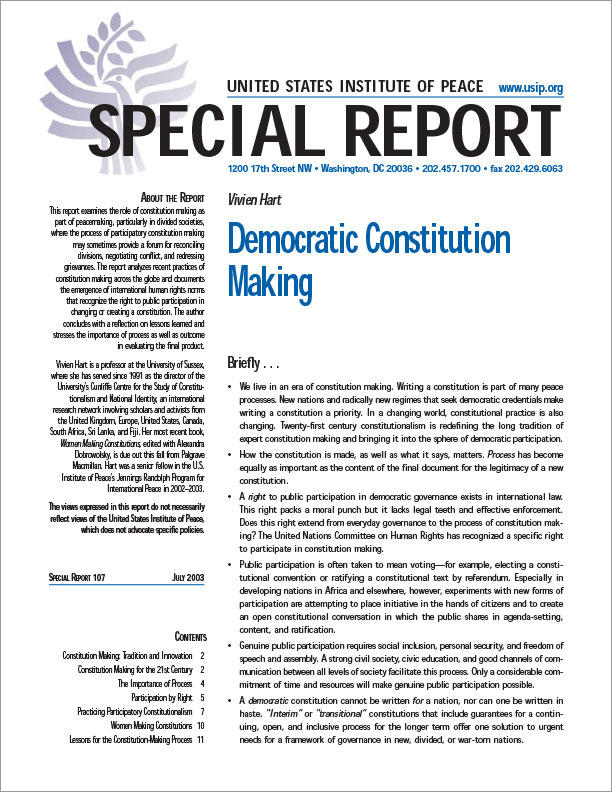
Summary
- We live in an era of constitution making. Writing a constitution is part of many peace processes. New nations and radically new regimes that seek democratic credentials make writing a constitution a priority. In a changing world, constitutional practice is also changing. Twenty-first century constitutionalism is redefining the long tradition of expert constitution making and bringing it into the sphere of democratic participation.
- How the constitution is made, as well as what it says, matters. Process has become equally as important as the content of the final document for the legitimacy of a new constitution.
- A right to public participation in democratic governance exists in international law. This right packs a moral punch but it lacks legal teeth and effective enforcement. Does this right extend from everyday governance to the process of constitution making? The United Nations Committee on Human Rights has recognized a specific right to participate in constitution making.
- Public participation is often taken to mean voting—for example, electing a constitutional convention or ratifying a constitutional text by referendum. Especially in developing nations in Africa and elsewhere, however, experiments with new forms of participation are attempting to place initiative in the hands of citizens and to create an open constitutional conversation in which the public shares in agenda-setting, content, and ratification.
- Genuine public participation requires social inclusion, personal security, and freedom of speech and assembly. A strong civil society, civic education, and good channels of communication between all levels of society facilitate this process. Only a considerable commitment of time and resources will make genuine public participation possible.
- A democratic constitution cannot be written for a nation, nor can one be written in haste. "Interim" or "transitional" constitutions that include guarantees for a continuing, open, and inclusive process for the longer term offer one solution to urgent needs for a framework of governance in new, divided, or war-torn nations.
- Participatory constitution making is today a fact of constitutional life as well as a good in itself. Despite challenging difficulties of definition and implementation, a democratic constitution-making process is, in the words of African observer Julius Ivonhbere, "critical to the strength, acceptability, and legitimacy of the final product."
About the Report
This report examines the role of constitution making as part of peacemaking, particularly in divided societies, where the process of participatory constitution making may sometimes provide a forum for reconciling divisions, negotiating conflict, and redressing grievances. The report analyzes recent practices of constitution making across the globe and documents the emergence of international human rights norms that recognize the right to public participation in changing or creating a constitution. The author concludes with a reflection on lessons learned and stresses the importance of process as well as outcome in evaluating the final product.
Vivien Hart is a professor at the University of Sussex, where she has served since 1991 as the director of the University's Cunliffe Centre for the Study of Constitutionalism and National Identity, an international research network involving scholars and activists from the United Kingdom, Europe, United States, Canada, South Africa, Sri Lanka, and Fiji. Her most recent book, Women Making Constitutions, edited with Alexandra Dobrowolsky, is due out this fall from Palgrave Macmillan. Hart was a senior fellow in the U.S. Institute of Peace's Jennings Randolph Program for International Peace in 2002–2003.
The views expressed in this report do not necessarily reflect views of the United States Institute of Peace, which does not advocate specific policies.